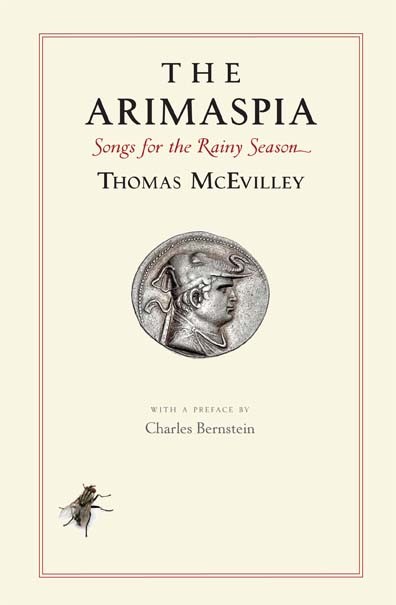
Thomas McEvilley: Arimaspia launch and McEvilley tribute

Wednesday, March 5, 2014 8:00 pm,
The Poetry Project at St. Mark’s Church
131 E. 10th Street, New York, NY
Celebrating the life and work of Thomas McEvilley (1939-2013) and the publication of his new books The Arimaspia: Songs for the Rainy Season, from McPherson & Co,, and Seventeen Ancient Poems: Translations from Greek and Latin.
My introducton to the book is here.
The tribute will feature Carolee Schneemann, Holland Cotter, Pat Steir, Les Levine, William Anastasi, Susan Bee, George Quasha, Richard Fletcher, Bruce McPherson, Stacy Szymaszek, Dove Bradshaw , Ann McCoy, David Shapiro, Joyce Burstein, Charles Bernstein (emcee), & special video tribute by Marina Abramovic .
McEvilley was a scholar, poet, novelist, art historian, critic, and translator best known as a provocative and influential art critic. He wrote many books on art and classical philology including The Shape of Ancient Thought, Sappho and three novels. He lived in New York City and the lower Hudson Valley.
"If Ezra Pound and Alexandre Dumas were to become one author and pen a historical novel about Greek philosophy and Indian spirituality in Late Antiquity, the result might be The Arimaspia. Best known for his writing on contemporary art and his novels, the late Thomas McEvilley was also a formidable philologist with a mastery of Greek and Sanskrit, and his neglected masterpiece, The Shape of Ancient Thought, dealt with the mutual influences of these two philosophical worlds. Arimaspia (his last novel) covers the same vast subject — but now as an adventure romance in which the escapades are metaphysical — and sexual. Alexander the Great and Nagarjuna appear, as does an unnamed modern college professor with a roving eye for sex-crazed graduate students — who may be a reincarnation of the unnamed Syrian/Greek narrator who makes the journey (on foot) to the East. Both characters are simultaneously cynics and mystics, all-too-human yet somehow immortal. Frankly I haven't had such a pleasurable reading experience in a dog's age: — like holding The Symposium in one hand and The Count of Monte Cristo in the other."
—Peter Lamborn Wilson
In a way, McEvilley was always neglected, because he was usually caught in the fact that he was the best art critic of his day. He was much more. The new book shows that he was a poet among anthropologists, and an erotic novelist in the line of Lolita and Pnin. He is by the by a hilarious breaker of taboos. To understand McEvilley one has to read his book on Sappho, where his sense of the psychological lyric is heartbreaking. He is a translator, and also a wild mistranslator. He had a lover’s quarrel with the world of pedants, and he played poetry with the nets up and down. How much of him is involved with a classicist’s vision of Tantric practices glazed with the rainwater of American poetics. Now we know not to place him too easily. His work is like a Twombly sculpture, a flower, a rainbow of jibes and whistles. His full work is a masterpiece of comical thought. With his introspective zeal about Yves Klein and primitivism, he is really nonpareil.
--David Shapiro
The Arimaspia is a work of grand collage and radical pastiche, in which McEvilley’s own poems, translations and narrative are hard to distinguish from the cascade of borrowed materials. Indeed, The Arimaspia is replete with citation and quotation: even the material that was not appropriated sounds as if it could have been –and each rubbing (as of an epitaph) comes across as fresh insight, made new for new time. Stunning in its archaic originality, The Arimaspia is a work of extraordinary learning, steeped in classical references that go well beyond the ken of most readers. At a certain point, the dance of the sources gives way to an immanent experience of refamiliarization, in which long-elided classical works come to life.
–Charles Bernstein, from the preface